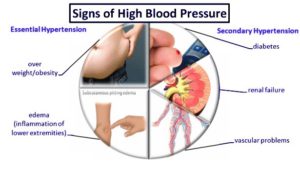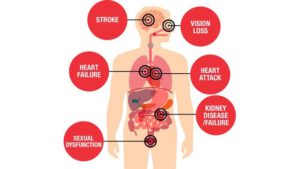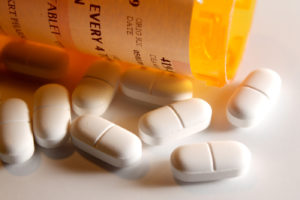Contents
High Blood Pressure
People have misconceptions that having blood pressure is a problem in the body. But it’s not a problem actually. Every normal body has blood pressure. Blood pressure can be defined as the pressure in the blood that flows through the arteries, and that has to happen in a normal body for it to function well.
The problem arises when the pressure rate is turning to abnormal. That is when it lowers down or rises higher. They can result in low blood pressure and high blood pressure problem respectively. Symptoms of high blood pressure and low blood pressure also vary.
Also called “hypertension”, high blood pressure falls under the category of cardiovascular disease. In a body with normal blood pressure, the blood fills the arteries with a normal pressure rate without causing harm to the arteries. As soon as the pressure increases, it starts to damage the arteries leading to deadly conditions.
Pre-hypertension
You can lower the risk of having hypertension if you are a bit cautious with your body functioning. Before actual high blood pressure hits you, a stage comes called, “prehypertension”. The condition says that your BP is just higher than normal.
If taken care of, you can go for help soon and lower the risk of underlying diseases. Recognizing symptoms of high blood pressure would help you in doing so.
High blood pressure is one of the most dangerous ailments that further leads to many other life-risking diseases. And it even has a more dangerous part and that is you might be suffering from it, and remain unaware. This is because it does not have prominent symptoms until it ranges to its severity. Still, you can be attentive keeping pace with your routine checkup.
Symptoms of High Blood Pressure
How can you come to know that you are suffering from high blood pressure? However, the symptoms of high blood pressure are not that flashy. But some of them are listed below that you might experience:
- Fatigue: Fatigue, in general, can be a symptom of many other diseases. The heart requires a good amount of oxygen-rich blood to function properly. Lacking it the heart begins to start functioning slowly leading to weakness and tiredness. You would feel tired even if not involved in physical activities.
- Severe Headaches: This is one of the symptoms of high blood pressure. But it is noticed that most people suffering from high blood pressure do not go through this. However, it can be the early symptoms in some of the cases.
- Vision Problem: In case a person is suffering from severe high blood pressure, this might be one of the symptoms. Because the high rate of blood pressure damaging arteries results in further damaging of the eye tissues as well.
- Chest Pain: This is one of the symptoms that are not to be ignored. However, there can be some other causes to it also. But it also indicates towards you having high blood pressure.

- Difficulty Breathing: Heavy breaths or difficulty in breathing are other symptoms. What happens in this condition is that the pathway that air makes through your and mouth to your lungs does not happen easily. This results in difficulty breathing.
- Irregular Heartbeat: It is frightening as a skip in heartbeat cannot be affordable for anyone. Even a stop in your heartbeat can cost your life.
- Blood In The Urine: Known as “hematuria” in medical terms, blood in the urine can be a reason for you to act immediately. This can be one of the severe symptoms of high blood pressure you better not neglect.
- Pounding: In the chest, neck, or ears: you might have experienced a feeling of high pulsing right after your exercise. This is because the blood pressure rate at that time is high. But if the palpitation continues to happen even when do dot exercise, or it happens regularly. Then there is a higher risk of you is suffering from hypertension.
These are some other symptoms of high blood pressure and that include dizziness, nervousness, sweating, trouble sleeping, and facial flushing, and blood spots in the eyes.
Causes of High Blood Pressure
As you cannot say that the symptoms you are going through point towards you having high blood pressure only, the same is the case with the causes as well. The causes can be divided into certain categories. The first could be:
Factors Causing High Blood Pressure
- Overweight
Your weight is directly proportional to your blood pressure levels. If you are overweight or obese, the risk rate of catching the problem of high blood pressure increases. As your weight increases, your blood pressure does. Losing weight has been one of the most recommended treatments for people already suffering from hypertension.
- Salt Consumption
Salt has a very strong part to play when it comes to our taste. Also, it is responsible for balancing out all the fluid levels in our body, enabling the nerves to transmit impulses and muscles to contract and relax. But consuming too much salt can cause a rise in blood pressure. With time, taking salt in excessive amounts leads to high blood pressure, which further causes blood vessels to narrow down, and the flow of the blood from the heart to all the other key organs starts getting partially obstructed.

- Lack of Vegetables And Fruits
Since your kidney needs a balanced amount of sodium and potassium to maintain the fluids in your blood, you eat a low-salt diet. But your blood pressure can still rise if you are not eating enough veggies and fruits.
- Lack of Exercise
With age, your blood pressure tends to rise but, if you don’t exercise or are not indulged in any kind of physical activities, the risk of hypertension gets even higher. Making exercise a habit can be a drug-free approach to lower your blood pressure.
- Smoking
You must be knowing that smoking is bad for your lungs. But did you know that it is also responsible for you getting hypertension and heart diseases? Cigarette has nicotine which raises blood pressure. The walls of your arteries become narrow and stiff. This further causes the clotting of the blood. And then, your heart stresses out and collapses as an attack or stroke.
- Sleep Deprivation
Your sleeping hours are inversely proportional to your blood pressure. If you sleep less, your blood pressure may go higher. Over time, when you sleep for fewer hours, your body is not able to regulate your stress and metabolism hormones, and this leads to high blood pressure.
Diseases Causing High Blood Pressure
There are certain health conditions that cause a rise in your blood pressure levels. Or you might say that high blood pressure can be one of the symptoms of the underlying diseases:
- Kidney disease
- Diabetes
- Kidney infections
- Glomerulonephritis
- Lupus
- Underactive hormone
- Overactive hormone
- Scleroderma
Medications Causing High Blood Pressure
Some of the medicines due to certain drugs, or their composition also cause a rise in blood pressure. They include:
- Contraceptive pills
- Steroids
- Some cough and old tablets
- Recreational drugs such as cocaine and amphetamines
- Herbal remedies, particularly with liquorice.
Blood Pressure Readings
Well, you may find measuring blood pressure a bit perplexing. But it’s not that difficult. The reading shows up in two numbers. The above one is higher than the other. The first number is systolic pressure that counts the force in the arteries when the heart beats or pumps the blood out in the body. And the second is the diastolic pressure, which counts the force in arteries every time the hearts rest between the beats.
The rate for normal blood pressure ranges from about 64/40 at the time of birth to around 120/80 in a healthy adult. However, they may vary even in normal adults after their indulgence in different activities. Like if they are measuring the blood pressure immediately after they come from a jog or do it after giving a speech, the rate will be naturally high. But you need to be careful that is it happening even when you are not indulging much in physical activity. Because if so is the case, you need to consult the doctor.
Normal Blood Pressure:
Systolic pressure <120 mm Hg and Diastolic pressure <80mm Hg.
When the Hypertension: systolic pressure >129, and the diastolic pressure >80.
Whereas if the systolic blood pressure gets over 140 mm Hg and the Diastolic gets 90 or over it, it is considered really high.
Complications of High Blood Pressure
As diabetes, and other chronic diseases, hypertension also comes with several other life-threatening risks and complications that can include some of these:
- Heart failure
- Heart attacks
- Vision loss
- Peripheral diseases
- Kidney disease
- Vascular dementia
- Arotic aneurysms
- Sexual dysfunction

If you are suffering from high blood pressure, reducing it to a certain level can restrict the occurrence of the above-mentioned health issues.
Treatment For High Blood Pressure
For treating your high blood pressure, you constantly remind, your doctors will suggest both medicines and some lifestyle changes. What works best depends on the intensity of their complications for each person.
Lifestyle Changes To Reduce Blood Pressure
The following lifestyle changes can help your lower high blood pressure:
- Consume less salt
- Quit alcohol and smoking
- Lose it, if overweight
- Exercise regularly
- Cut down on caffeine
Some people with high blood pressure also need to take some medications, maybe one or more to stop their blood pressure from getting too high.
Medicines For High Blood Pressure
If you’re diagnosed with high blood pressure, your doctor may recommend some, mostly one medicine to keep it under control. These come as tablets and usually need to be taken once a day.

Common blood pressure medicines include:
- ACE inhibitors – such as enalapril, lisinopril, perindopril, and ramipril
- angiotensin-2 receptor blockers (ARBs) – such as candesartan, irbesartan, losartan, valsartan and olmesartan
- calcium channel blockers – such as amlodipine, felodipine, and nifedipine or diltiazem and verapamil
- diuretics – such as indapamide and bendroflumethiazide
- beta-blockers – such as atenolol and bisoprolol
- alpha-blockers – such as doxazosin
- other diuretics – such as amiloride and spironolactone
The medicine recommended for you will depend on certain factors like how high your blood pressure is, what is your age, and your ethnicity.
Prevention of High Blood Pressure
To maintain a healthy range of your blood pressure level, you need to keep your lifestyle healthy. Some of the earlier approaches can be:
- eating a healthy diet
- maintaining a healthy weight
- being physically active and fit
- stop smoking
- limiting alcohol
- getting enough sleep.
It is advisable to never neglect if you are experiencing any of the symptoms of high blood pressure. Seek medical help as soon as possible. And if you are diagnosed with hypertension, just keep a tab on your blood pressure levels. Try every possible way to keep them in control. Remember, your blood pressure levels should neither go too high nor too low. In both conditions, your body can serious damages. Never skip the medicines prescribed to you by the doctor. Not for a single day.
A Word From Mantra Care
If you are looking for an affordable hypertension treatment MantraCare can help- Book a trial hypertension care session


